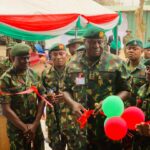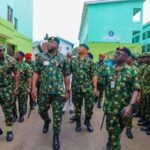By Augustine Ehikioya
Following the new threats from security challenges in the country, the Nigerian Air Force (NAF) has amended its training curricula to meet up with the new demands.



The Chief of the Air Staff (CAS), Air Marshal Oladayo Amao, has disclosed that there is need to review the curriculum of its training institutions and facilities in order to make NAF personnel combat ready.
He said it will also make them operate at optimum level to counter both domestic and foreign threats.
The Air Chief spoke at the winging ceremony of some pilots and operators held at NAF Headquarters, Abuja.
This was contained in a statement issued by the Director of Public Relations and Information (DOPRI), Nigerian Air Force, Air Commodore Edward Gabkwet, and made available to Security Watch Africa (SWA).
The statement said “According to Air Marshal Amao, the NAF recently reviewed the curricula of the various schools in the Air Force Institute of Technology (AFIT) to meet expected standards, whilst also conducting instructional training for the instructors to ensure enhanced performance.
“He also revealed that the training curriculum for NAF cadets at the Nigerian Defence Academy has been reviewed and new criteria specified for NAF officers to be eligible for posting to the Academy as instructors.



Also affected are some selected ground and flying schools where the CAS disclosed that, ‘I have authorized the audit of selected institutions in the NAF, including flying schools, by a team of experienced retired senior officers with a view to upgrading the practices and facilities at the institutions to meet international standards and best practices.’
He went further to state that special arrangements have also been made to upgrade operations training facilities to enhance the operational capacity of NAF operators in anticipation of increased tempo of air operations with the recently acquired platforms, while sustaining capacity building programmes for the NAF Regiment in joint efforts for synergy of air-ground integrated operations with sister Services.

Overall, these efforts, according to the CAS, are geared towards positioning the institutions and facilities as centres of excellence that would produce pilots, engineers, technicians and other specialists that are well equipped to carry out their constitutional roles more effectively and efficiently.







